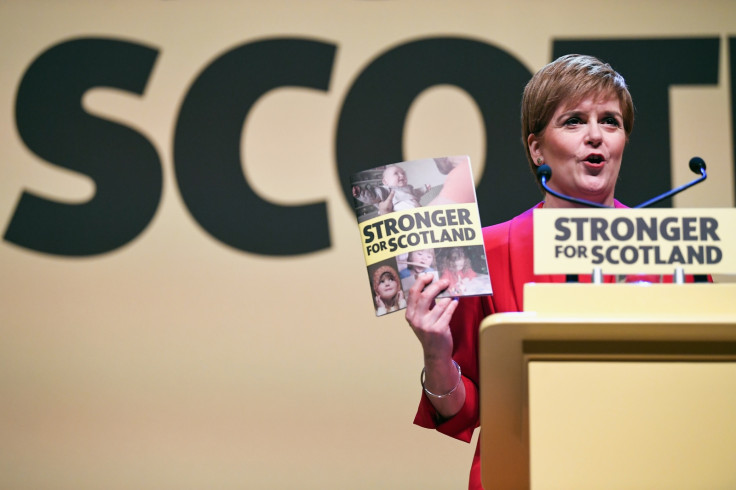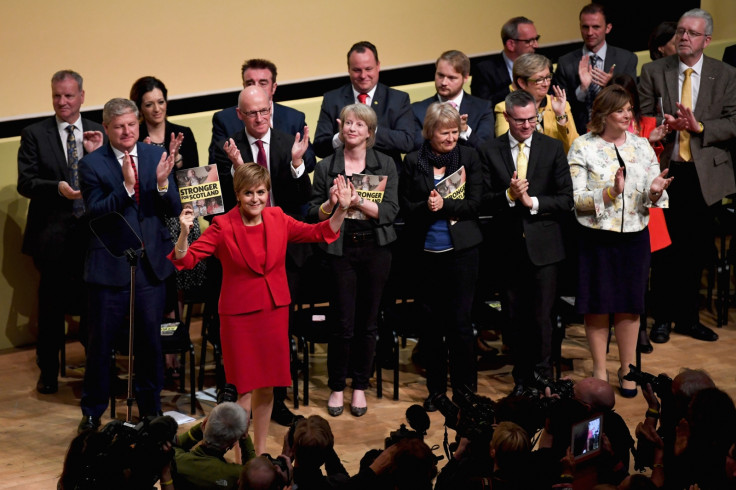Anti-austerity vs anti-independence in Scotland's old school election campaign
The SNP today published its manifesto Stronger for Scotland.

As thrilled as the SNP are with their successful manifesto launch, they must know privately that it's less than ideal to be informing the public of their full plans with just nine days to go until the election, and with many postal votes already having been irrevocably cast.
That wasn't something they had any control over – the horrific tragedy in Manchester made a lengthy delay inevitable. The hope now is that necessity can be turned into a virtue, and that the party will reap some benefits from having their day in the limelight so close to the end of the campaign.
The change of plans is rather emblematic of the year Nicola Sturgeon has had since the EU referendum, with a number of strategic rethinks forced upon her not only by the fact of Brexit, but also by its numerous unforeseen consequences.
If she wasn't quite sure last spring what former British Prime Minister Harold Macmillan was getting at when he famously said "events, dear boy, events", she's been well and truly brought up to speed since.
The rollercoaster ride of the last twelve months has repeatedly tasked her with finding a way of turning unexpected and unwanted events to her party's advantage. Fortunately for her, she's not known as an unusually agile politician for nothing.
Contrary to the claims that she is obsessed with independence to the exclusion of everything else, all of the indications prior to the EU referendum were that she was looking forward to the period of calm that would follow the anticipated Remain victory, with no second vote on independence on the horizon until the 2020s.
But the prospect of Scotland being dragged out of the EU left any genuine supporter of national self-determination with no choice - plainly the timetable had to be shortened dramatically. Rather than rueing the enforced change of plan, Ms Sturgeon turned a crisis into an opportunity by full-bloodedly putting independence back on the agenda within just hours of the Brexit vote being confirmed.

And then, having very carefully chosen March as the moment to confirm her decision to call a second independence referendum, the next uncontrollable turn of fate quickly came along - Theresa May's shock decision to hold a snap election.
It's reasonable to assume that if Ms Sturgeon had known what was coming, she would have held off until the election was over. In several battleground constituencies, the spectre of a referendum has painted a target on the SNP's back that otherwise wouldn't have been there, with the Tories in particular seizing the chance to whip hardline unionist voters into a frenzy with a logic-defying plea to "vote against having a vote".
But here too, the First Minister has opted against mourning the hand she was dealt, and has instead found a huge positive in it. Yes, it's conceivable that a few SNP seats may be lost now that voters are being confronted head-on with the independence issue, but at least every seat that is actually won will contribute to an unambiguous mandate that cannot be plausibly challenged even by the most skilled of hair-splitters in the Tory party.
It's likely there will be a very large number of such seats. Ruth Davidson is calling upon voters to reject a referendum, and all of the opinion poll evidence so far suggests that they will emphatically decline to do so.
The SNP manifesto carefully defines winning the majority of Scottish constituencies at Westminster (which could be achieved even with a net loss of 26) as the completion of a 'triple lock' mandate for a referendum – with the earlier two components being victory in last year's Holyrood election, and the successful vote in the Scottish Parliament itself.
The overriding focus of the manifesto is not independence, however. It's opposition to the Tories and to austerity. Just by chance, the unintended delay of a week means that this message may well resonate more, because the main thing that has changed over that period is the slight tightening of the UK-wide polls, with the election being increasingly framed as an old-fashioned choice between the Tories and the forces of progress.
The SNP will be seen to have firmly chosen a side in that battle at a time when Scottish Labour are still preoccupied with begging for tactical votes from Tory voters, and when the Scottish Tories themselves are putting out Party Election Broadcasts that incomprehensibly invite voters to regard a UK general election as being solely about "how best to send a message to Nicola Sturgeon". Essentially, the UK-wide campaign has now caught up with the SNP's strategy and left the unionist parties behind.
There are even signs that the supreme irony of the situation is beginning to dawn on some voters who had flirted with the Tories. This election, just like the local elections before it, has been turned into a de facto referendum on independence – not by Nicola Sturgeon or the SNP, but by the party that claims to want to stop a 'divisive' referendum at all costs.
Eventually the penny will drop that the only way to thwart Ruth Davidson's crazy obsession with having divisive votes about independence is to get on with the real thing.
© Copyright IBTimes 2025. All rights reserved.





















